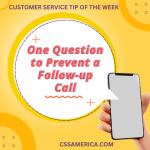I was an Emergency Room patient recently thanks to a kidney stone. I learned some painful lessons about how I need to modify my diet. I learned some financial lessons about how to avoid the E.R. next time, now that I know how to read kidney stones symptoms. And I learned some customer service lessons from the experience.
Let’s focus on customer service. Here are a few lessons learned:
· Accessibility to service is a wonderful thing. To get my question answered about my symptoms, I was able to reach an on-call nurse at my physician’s office at 5:00 a.m. on a Monday. I was aware of that service, having used it before for less painful reasons, and that accessibility, that free advice is one of the things I love about my physician’s office.
· Employee knowledge is a component of the service delivered. That same nurse told me to go to the E.R. because she thought it was gallbladder-related. It turns out that she misinterpreted my symptoms, and the E.R. triage nurse knew immediately I had symptoms of a kidney stone, not a gallbladder issue. If the first nurse would have better “read” my symptoms, she may have saved me an E.R. trip (not complaining, mind you – just an observation).
· An hour wait is not an hour wait is not an hour wait. Wait times can be made to seem shorter or longer than they are in actuality. My wait time to see the triage nurse was only 20 minutes, but it seemed interminable. There was no dialogue during the wait, and I was told they’d see me “quickly” – a nebulous term at best, and one that led me to believe it would be immediate. However my 3.5 hour wait between when my x-rays were done and when the physician saw me wasn’t nearly as bad as you’d think. Although I wasn’t thrilled with the wait, I was given some pain medication early on, was checked on several times by the nurse, was taught how to use their funky television remote control, and was given a warm blanket and offers of other support by a volunteer.
· Much of customer service is about managing expectations. Whether it was my understanding of a next step in a process, understanding who would be my care giver, knowing what the diagnosis could be, understanding whether I’d be released that morning or whether I needed to be held – anything that the organization did to give me a clearer expectation of what would happen next and when it would happen helped to make the experience that much easier to bear.
Learn the lessons of my encounter with customer service during the attack of the kidney stone (sounds like a bad 1970’s movie title, huh?). Be knowledgeable and accessible. Communicate with customers, and “distract” them during waits. Set and manage customer expectations.
Relieve your customer’s pain.
Read our New Book – “Ask Yourself…Am I GREAT at Customer Service?” http://www.amigreatat.com/
Listen to our latest podcast episode of “Stepping Up Service” on The MESH Network at http://themesh.tv/stepping-up-service/
Interested in improving your company’s customer service? See more at our new website! http://www.cssamerica.com/





















